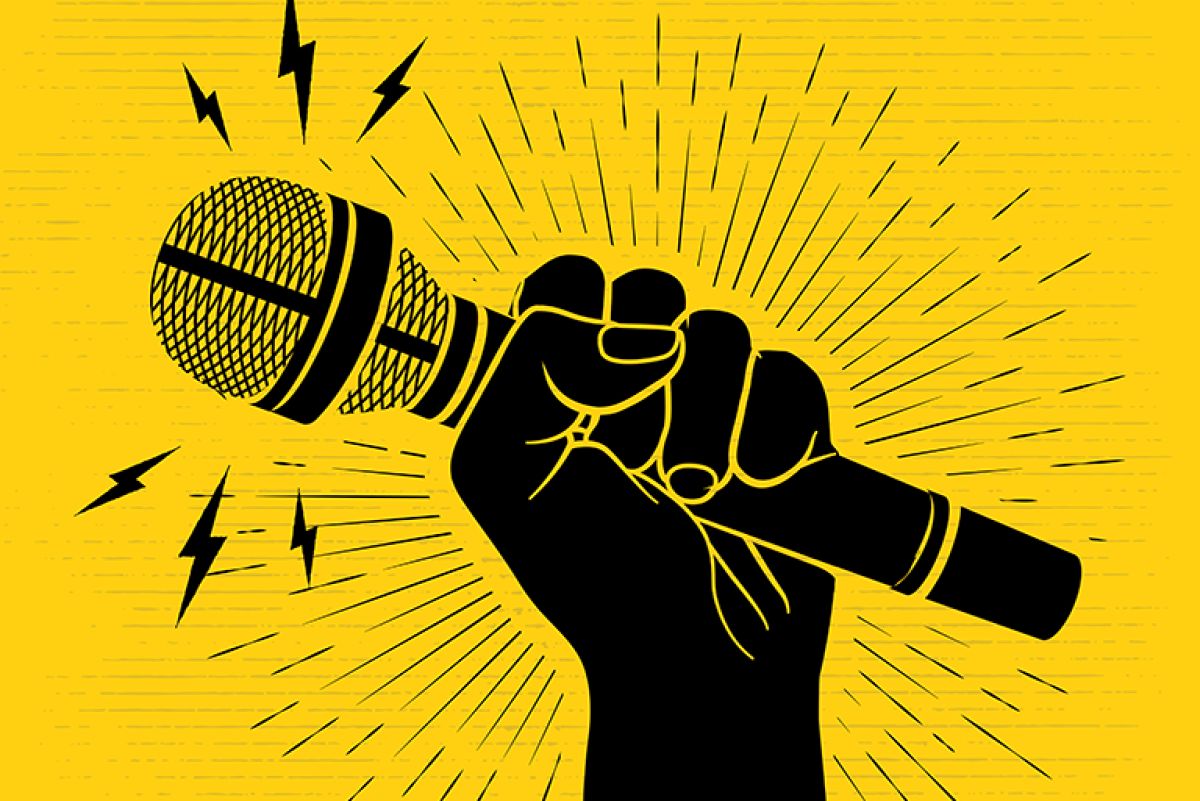Annie, IU MFA candidate Anna Doyle, is a Philadelphian who loves the past. She’s fascinated with the story that the Johnson house was a stop on the underground railroad in those abolitionist pre-Civil War days. She’s a partner with Curtis, IU sophomore BFA candidate Kabir Gandhi. He’s always trying to move into the future. As he says, “I’m always pitching.” Together, they host a quite unpopular podcast from Annie’s living room.
The two are at odds. Annie wants to produce a history show. Betsy Ross and the Flag, would be her ideal topic. Curtis wants to project more into the future with a series that he’s pitching to NPR via Annie’s former lesbian lover. The play’s discoveries and investigations gradually focus more and more on the “queer history” of Philadelphia.
“Time Is on Our Side” by R, Eric Thomas is the IU Department of Theatre, Drama and Contemporary Dance’s second entry in their Amplified Series. It’s a series dedicated to plays written by Black writers, seeking a stage for their voices, experiences and stories
The zoom experience is still new and intimate for me. It didn’t help that when the screen became active “Annie” instead of “Time is on Our Side” was the posting. My computer screen is just twelve inches wide and seven inches high. Frequently there are just two squares with a conversation. Sometimes there are three and occasionally there is a “close up” of a single speaker. Theatrical blocking isn’t a strong point for this show.
The Director Leraldo Anzaldua and stage manager Tess Bladow invite us to an empty chair at a familiar table. It’s a nice metaphor, yet with Annie and Curtis at odds, it’s not one that I’m comfortable with. In “Time Is on Our Side,” Annie operates from a rather limited palate and Curtis too, is rather stuck in his reaction.
That’s not the case with guest artist Shunte Lofton. The outrageous Lofton plays two women, Claudia and Giselle, and one man, Mr. Romandi. She’s bold, brassy and openly suggestive. She frequently occupies the center stage of the screen. It’s from two women and one man that we learn more about the hidden history of gay culture in Philadelphia.
.Annie’s grandfather was accused and convicted of bribery. And it was of a strange sort of Robin Hood style gestures. They actually helped people. He gave Annie a very comprehensive diary, that she’s been mystified by. It’s quite specific about the locations of lunches, dinners and breakfasts. There’s also a letter that comes after his death. Annie missreads that, just as she’s misread the diary.
Throughout the first part of “Time is On Our Side,” IU Musical Theatre BFA student Alexander Aybar has been seen and appeared in voice overs as the narrator. Aybar sports shoulder length hair and an IU scarf. A couple of times during the first act there have been technical difficulty announcements and a suggestion that we shouldn’t go away.
Meanwhile, Annie discovers a concealed, sparely documented diary of her grandmother. The diary, which Curtis would like to see, reveals a buried connection to the early LGBT rights movement and a possible liaison with another woman, Bea Fremont.
The first act closes and then there’s an intermission with music. The music helps but it would have been nice to either count down, or let the audience know how long it would be before the action started up again.
Coming in the second act is IU Sophomore Noah Moore. Moore appears as the laid- back actor, Rene. He has some wonderful lines. “I don’t have time to be murdered today!’ is one of them. He’s hesitant about his appearance for some later auditions. Moore also appears as the reclusive Blankenship, the one who holds the AIDS quilt square that Annie wants to see.
By now, you’ll be thinking that everyone in this play from the historical figures to the present day players is either queerly partnered or desirous of same. and you’d be right. It’s not a game changer if I tell you that the previous generations carefully hid the connections that the current ones flaunt.
As “Time Is on Our Side’s” playwright R. Eric Thomas and the IU Theatre’s Amplify series asks, "How do we let go of the past? And when will it let go of us?"
I’m George Walker







